Like many of you, I have been glued to my television for the past few nights watching the History Channel remake of the miniseries "Roots". It's been nearly forty years since the original broadcast aired in 1977 and this tale about an African American family's journey from the shores of Africa through the most trying times in United States history is just as relevant then as it was when Alex Haley first penned the book that would inspire the phenomenon. The new version does more than tell the story of one of the worst times on American history.
1. Mandinka Kept Slaves
It's important to understand how slavery functioned when telling a story like this. Laurence Fishburne narrates, telling the audience about slavery in the region and how it was different from that of the Atlantic Slave Trade. Yes slavery happened between tribes, but unlike slavery in America, these people were able to make lives for themselves when their service was finished. "Then the Europeans arrived", and the trade changed. This shift led to the more cruel and brutal slave trade we know now, one completely different from the old system.
2. Seeing The Customs
Derek Luke as Silla Ba Dibba a respected Mandinka warrior and Kunta Kinte's uncle
Rarely does mainstream media show positive images of African civilizations before European occupation. This "Roots" introduces us to the Mandinka in a way the previous broadcast does not. Religion, language, and rites of passage produced a more bold Kunta who was sure of the path he was going to lead. Before Kunta Kinte was a slave, he had a family and a community. This is taken from him when he is sold to the Europeans by an enemy tribe.
3. I Am Kunta Kinte
Malachi Kirby as Kunta Kinte the Mandinka warrior who
One of the most iconic scenes in both versions of "Roots" is the moment Kunta is whipped for refusing to use the slave name that is given to him, Toby. Identity is important in all cultures. For Kunta, his name ties him to his home. Relinquishing that means resigning himself to the life he has been forced into and accepting that he is someone's property, "like the hogs and the horses", as slaves were. Kunta Kinte is a person, Toby is a slave.
4. Henry
Forest Whitaker as Fiddler with Malachi Kirby as Kunta Kinte
For most of the series, he's referred to as Fiddler, the charismatic musician who becomes a father figure to Kunta when he comes to the Waller Plantation. His master lends him out to perform all around the area and Fiddler is the name by which he comes to be known .When Fiddler first helps Kunta try to escape, Kunta asks for the "name from his mother", Henry. Later, Fiddler valiantly sacrifices himself for Kunta and his infant daughter Kizzy, but before dying he tells the catchers that his name is Henry. He dies ensuring that his true identity is known.
5. Never Let Them Put The Chains On Your Mind
Malachi Kirby as an older Kunta Kinte teaching his daughter Kizzy, played by Emyri Crutchfield, the ways of a Mandinka warrior
The key to keeping slaves from rebelling against their masters was keeping the mind weak and the body strong. Kunta is determined to pass on his heritage to his daughter Kizzy. Aside from putting her through a series of trials similar to what he went through back in Juffure, he reinforces to her that as long as she is strong mentally, she can endure anything physically.
6. Reading Is My Way of Being a Warrior
Emyri Crutchfield as Kizzy with Mandela Van Peeples who plays Noah, a fellow slave
It was illegal for slaves to know how to read and write, but when Kizzy is presented with the opportunity to do so, she seizes it. Kunta is upset when he finds out Kizzy has been doing something thing that could put her life in danger, but she tells her father that reading is her form of rebellion. Kunta chose to rebel physically, Kizzy chose to do so mentally.
7. A Name Is Who You Are
Anika Noni Rose as an older Kizzy with her son, Chicken George, played by Rege-Jean Page
Kizzy is grown and has a child of her own, Chicken George, who is determined to win the approval of his father Tom Lea who also happens to be his owner. When George has his first child, Tom suggests George name the baby after him, an idea Kizzy loathes. While George doesn't see why it's a bad idea, Kizzy knows naming the child after Tom will further bind them to their cruel master. To prove her point Kizzy tells George, "My daddy took whippings night and day to protect his name".
8. I'll Gladly Hang For It
Anika Noni Rose as Kizzy, Kunta Kinte's daughter and Chicken George's Mother
One thing that isn't often discussed is the experiences of women during this time, Kizzy endures years of rape from Tom Lea, the result is their son George. After decades of living under Tom's cruelty, she has the opportunity to be free after a suitor named Marcellus offers to pay for her freedom. She refuses knowing that her children and grandchildren would be left at the mercy of her master. When Tom Lea finds out about her plans to leave and tries to force himself on her, she tells him that she'll kill him if he touches her children and would happily pay the consequences. This is the first time since she was sold that Kizzy forcefully takes her fate into her own hands.
9. Your Whole Life You've Been a Slave Too
Jonathan Rhys Meyers as Tom Lea, the landowner who is also Chicken George's Father
After more than 20 years in England, George returns home to find his mother dead and his wife and children sold off. Tom Lea, his father and former master, is still alive and completely destitute. Tom Lea was always looked down on by the other white landowners in the area for a number of reasons, the biggest one being his Irish origins. Even though he has nothing, Lea still believes he is better than George because he's white, even though George is now a free man just like him. Tom clings to an old way of thinking because it's the only thing that gives him a sense of superiority. That's what makes it so important when George tells him, "You're whole life you've been a slave too, you just didn't know it".
10. Morning Dove
Rege-Jean Page as Chicken George and Erica Tazel as his wife Matilda
After being sold to pay off Tom Lea's debts, George returns to free his family from slavery. He learns that 3 of his 7 children were sold away and that his wife and other 4 children are owned by Mr, Murray, a decent man with a cruelly racist son. George does all he can to reconnect and keep his family together. At the core of this is his love for his wife Matilda who balances him with her calm demeanor and strength. While slaves weren't legally allowed to marry, George and Matilda show the strength of the bonds that were made despite the harsh realities of plantation life.
11. I Hope My Story Honors Him
From left to right: Rege-Jean Page as Chicken George, Laurence Fishburne as Alex Haley, and Sedale Threatt Jr. as George's son Tom
At the end, we see Laurence Fishburne as Alex Haley, writing the story the helped inspire this series. As he finishes the final page, he is greeted by the spirits of Tom and George who take him back to meet all of his ancestors, including Kunta Kinte.
While there were -plenty of pivotal moments in the reboot of "Roots" these illustrate the forgotten stories and the important facts that need to be told. Some argue that enough slave stories have been told. "Roots' is not about slavery itself, it's about the people who endured and the heritage that resonates with people of African descent to this day.





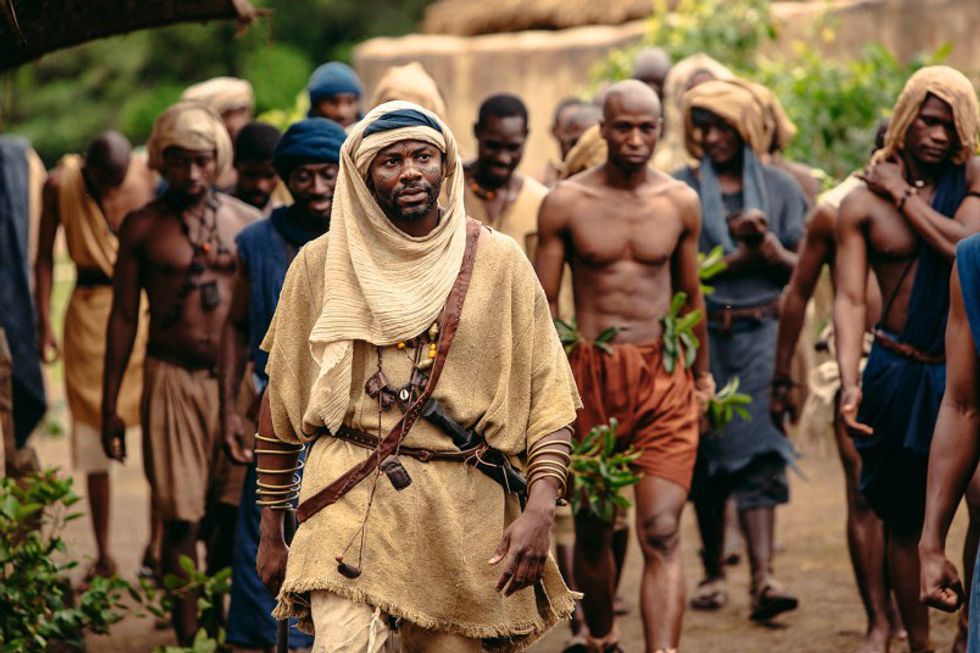

 Forest Whitaker as Fiddler with Malachi Kirby as Kunta Kinte
Forest Whitaker as Fiddler with Malachi Kirby as Kunta Kinte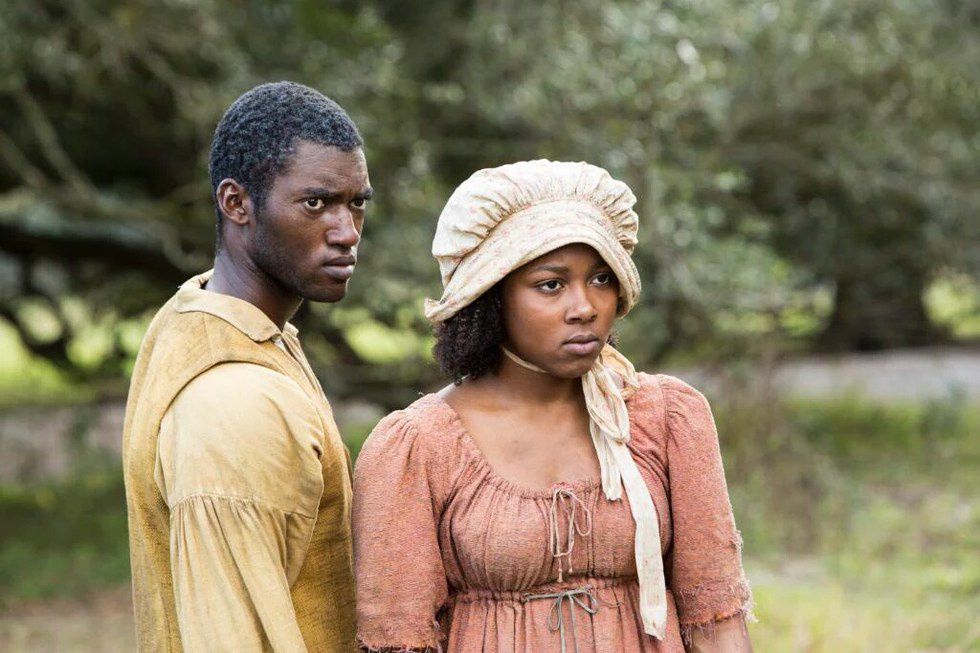
 Emyri Crutchfield as Kizzy with Mandela Van Peeples who plays Noah, a fellow slave
Emyri Crutchfield as Kizzy with Mandela Van Peeples who plays Noah, a fellow slave Anika Noni Rose as an older Kizzy with her son, Chicken George, played by Rege-Jean Page
Anika Noni Rose as an older Kizzy with her son, Chicken George, played by Rege-Jean Page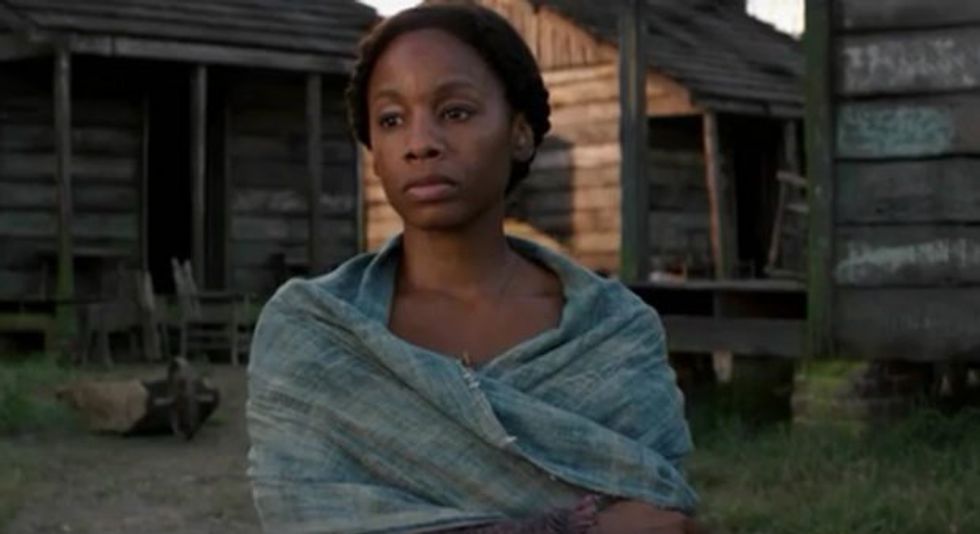 Anika Noni Rose as Kizzy, Kunta Kinte's daughter and Chicken George's Mother
Anika Noni Rose as Kizzy, Kunta Kinte's daughter and Chicken George's Mother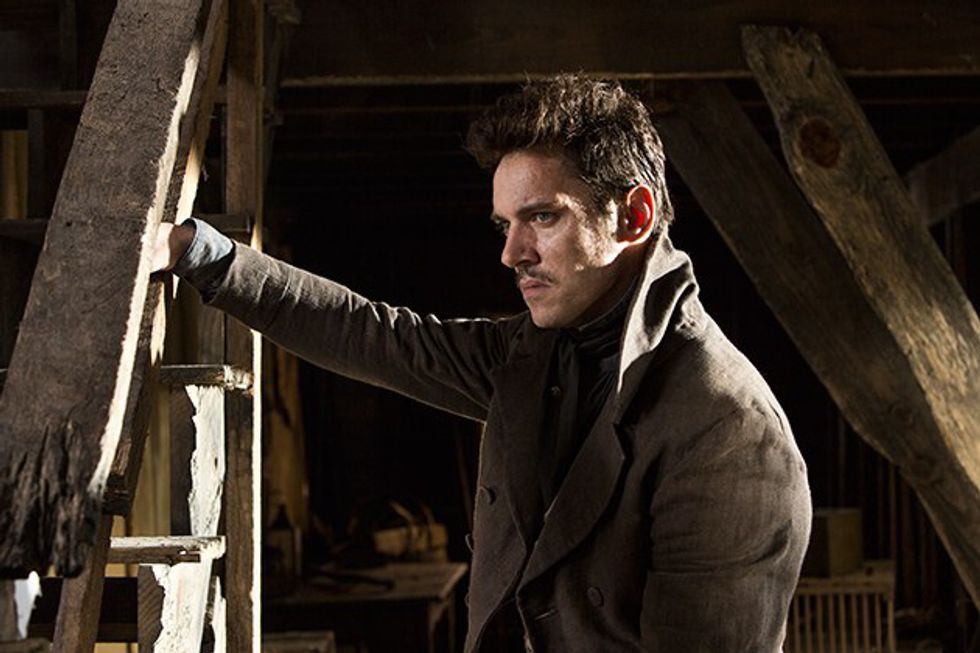
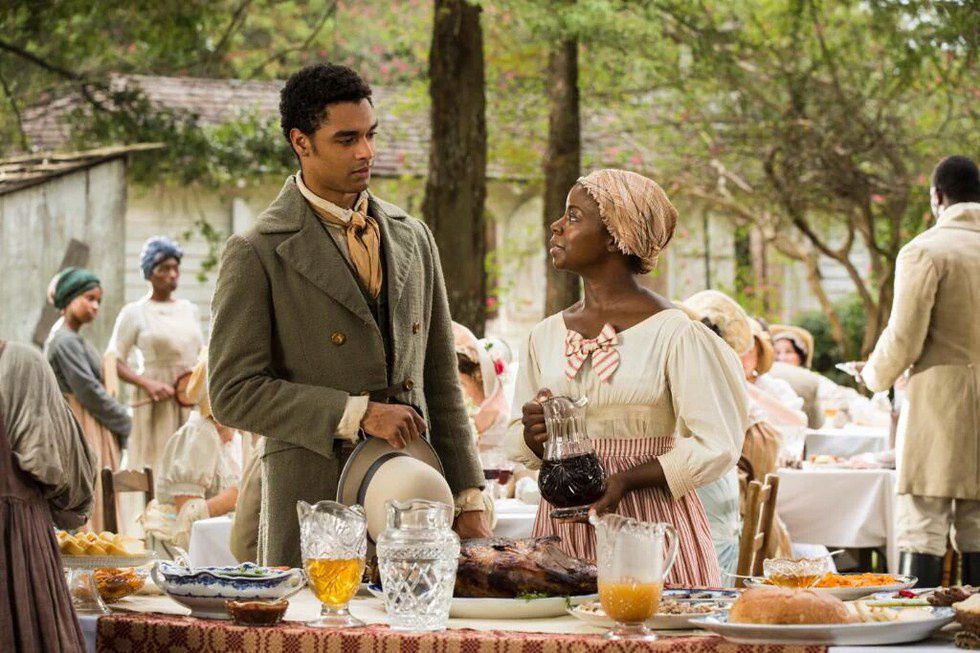 Rege-Jean Page as Chicken George and Erica Tazel as his wife Matilda
Rege-Jean Page as Chicken George and Erica Tazel as his wife Matilda From left to right: Rege-Jean Page as Chicken George, Laurence Fishburne as Alex Haley, and Sedale Threatt Jr. as George's son Tom
From left to right: Rege-Jean Page as Chicken George, Laurence Fishburne as Alex Haley, and Sedale Threatt Jr. as George's son Tom















